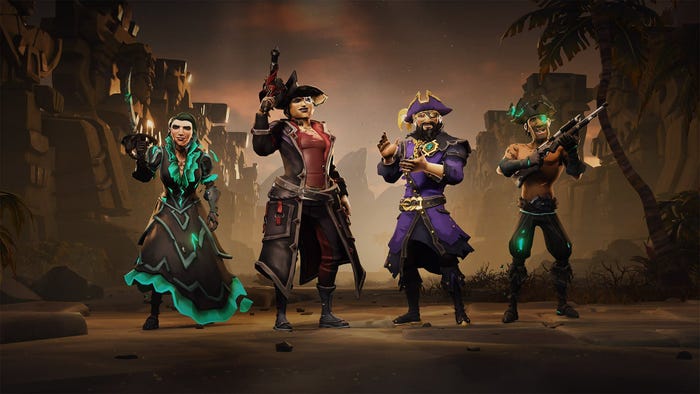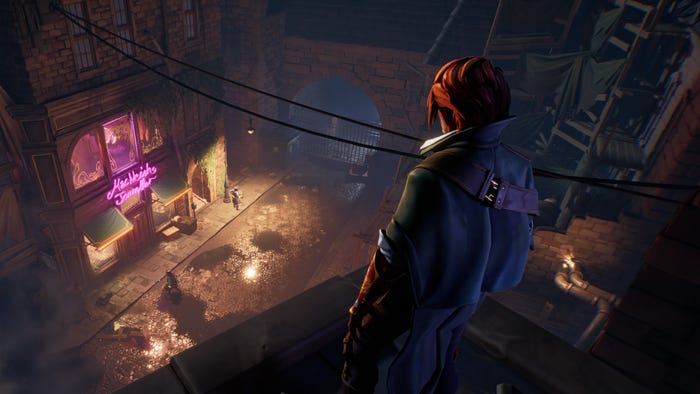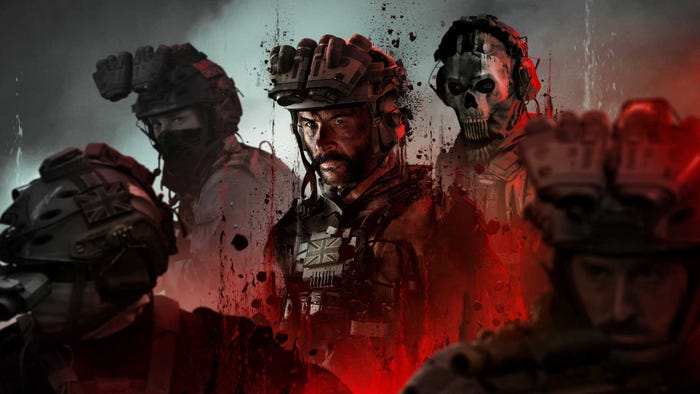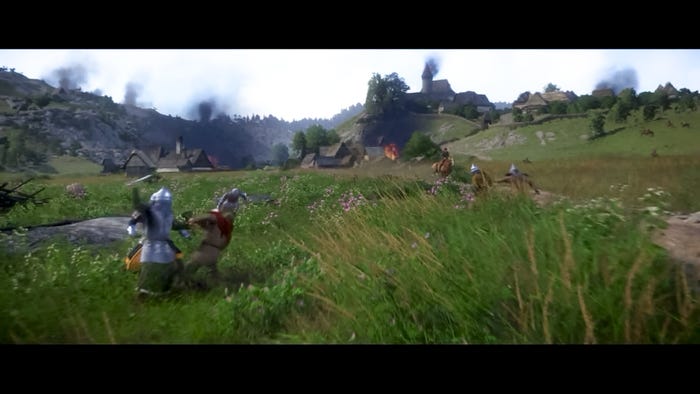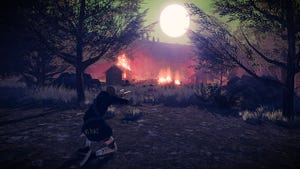For decades, Yoshiki Okamoto was one of Capcom's most renowned developers -- but after a mobile hit, he tells Gamasutra that console games are "just not something I want to deal with anymore."

For decades, Yoshiki Okamoto was one of Capcom's most renowned developers -- he'd created arcade hits like 1942 in the '80s, and in the '90s, was the producer of its all-conquering Street Fighter II. He worked on Resident Evil and even developed portable Zelda games for Nintendo. But in the mid 2000s, Okamoto finally cut ties with Capcom and opened up his own studio, Game Republic. Some of its games were good -- such as Majin and the Forsaken Kingdom, for PS3 and Xbox 360. Others were downright bad -- like Clash of the Titans, which is based on the film of the same name and is remarkably unpleasant to look at or play. In the end, Okamoto couldn't make a success of Game Republic, and it shut down in 2011. Suddenly, though, his name is making headlines for the right reasons: He's popped up with a major new title, Monster Strike. Right now, it's the highest grossing game on the Japanese iOS charts, right ahead of Puzzle & Dragons. Like Puzzle & Dragons, it has you managing teams of monsters; but quite unlike it, it's a co-op action game that's best compared to air hockey: You slide the monsters at enemies to progress. Its arcade roots are clear. In this interview, Okamoto, who's in charge of Monster Strike's game design, answers questions about his career -- including why he's "never" going back to making console games -- and developing the mobile phone game that's made local co-op play a phenomenon. He's joined by his collaborator, the game's producer and director Koki Kimura, from Japanese social startup Mixi, which is Monster Strike's publisher, and Michael Oakland, who also works at Mixi in Tokyo, in localization, and who interpreted this interview. The relationship is so close that Okamoto works out of Mixi's offices. I was wondering if classic arcade game development skills contribute to developing mobile games. They have some similarities: Short sessions, repeatedly getting people to invest small bits of money, rather than one big purchase.
"The thing about Monster Strike is that it was built from the ground up, by us, to be a communication tool -- to get people playing games together in the same room again."
Yoshiki Okamoto: The play-time is short, right? The skills that I learned making arcade games... Really making it fun in short bursts is really the big thing. The amount of time that is generally spent playing Monster Strike is the same as you'd spend on an arcade game. There's a major similarity. So you have to keep it entertaining in short bursts. What about the hook of getting people to pay? YO: Well, if we're talking about monetization, it's Kimura that we should ask, isn't it? Not me. Koki Kimura: That hook of getting people to pay is basically the same; it revolves largely around continues. The thing about Monster Strike is that it was built from the ground up, by us, to be a communication tool -- to get people playing games together in the same room again. One of the things that we've done to really encourage this type of gameplay is that when you're playing alone, you'll have to spend your own continue to continue. When you're playing with four players, it takes one continue for everyone to keep going. So it makes it cheaper, and that way, you have a discussion: "Should we continue? Should we not?" And only one person has to make that sacrifice.
"Monster Strike is a relatively small game; it's not a big triple-A game."
How does your expertise over years in the game industry play into making a game like this -- and why is it such a big hit? YO: One thing I was able to use my arcade experience to really make Monster Strike a success is that Monster Strike is a relatively small game; it's not a big triple-A game. I went from working on console games that are really huge in scale -- but in Japanese we'd call this a "handheld" game, in that it's about the size of your palm. It's a much smaller, more focused experience.  Monster Strike. The main playfield is self-contained and action-based -- it really does feel like a classic arcade game in that respect. Using my experience in creating arcade games -- while we were creating the game, while we were talking about what kind of concepts we would add in, I could just close my eyes and imagine myself playing the completed game as we were creating it, at that time. I could imagine and project what was missing, what needed to be improved, what needed to be taken out, et cetera. So that made it into a manageable size, because I was able to do that. Are you enjoying working on this more than you were working on big console games recently? YO: It's fun. I'm enjoying it, completely. Why is it more enjoyable to you?
Monster Strike. The main playfield is self-contained and action-based -- it really does feel like a classic arcade game in that respect. Using my experience in creating arcade games -- while we were creating the game, while we were talking about what kind of concepts we would add in, I could just close my eyes and imagine myself playing the completed game as we were creating it, at that time. I could imagine and project what was missing, what needed to be improved, what needed to be taken out, et cetera. So that made it into a manageable size, because I was able to do that. Are you enjoying working on this more than you were working on big console games recently? YO: It's fun. I'm enjoying it, completely. Why is it more enjoyable to you?
"What I really enjoy about making mobile games is that you're much closer to the user."
YO: What I really enjoy about making mobile games is that you're much closer to the user. Especially with what we do in Monster Strike -- we have rotating events. The events have to be played in the time that they're available -- so it brings the community together all at one time. So, we're all inside the office playing together with real-time users, and it creates a situation where you can get a bird's eye view of, "Okay, these people on Twitter aren't happy about this thing," "These people really enjoy this thing," and because it's not a big, bloated triple-A game, you can actually make real-time changes based on this feedback. And so we get to see the users enjoy the game in real-time, and that's what we really like about that.  An in-game ad for the current event, as of this writing. In Japan, it really seems like the mobile game market has overtaken the console game market in size. Why do you think that is? KK: One reason that the mobile game industry is getting bigger than the console game industry -- and this is something that we've talked about before, just together -- is that people in Japan, especially, don't have a lot of time on their hands. So they want to find experiences that they can play for five minutes, 10 minutes. And there's been a growing need to be able to do that. You know, when you're playing a console game, you're just focused in on the screen. Even if you're playing online, it's a solitary experience when you get down to it. So we thought, "How could we make a game that encourages people to get together and play?" And the greatest piece of hardware for that is the mobile phone, because everybody has one. You don't have to buy any new hardware; you don't have to buy any new software. You have it at all times, so you can use it wherever and whenever, with anybody who happens to be around you. You had a long experience making console and arcade games, and now you're making mobile games. The Japanese console market is downtrending, and that may be permanent. What's the future of console games? Do you even still think about them? YO: [laughs] I have no idea, because I have totally, basically, cut myself out of the console realm. So you don't expect to go back? YO: Yeah, never. Game Republic made some good games, in my opinion. The company never became a big success. It always seemed like, "Why not?" It should have. But obviously, you did this, and instantly you have a big success. [Ed. note: For some background on Okamoto and Game Republic, read our 2008 interview, a frank look inside the studio.]
An in-game ad for the current event, as of this writing. In Japan, it really seems like the mobile game market has overtaken the console game market in size. Why do you think that is? KK: One reason that the mobile game industry is getting bigger than the console game industry -- and this is something that we've talked about before, just together -- is that people in Japan, especially, don't have a lot of time on their hands. So they want to find experiences that they can play for five minutes, 10 minutes. And there's been a growing need to be able to do that. You know, when you're playing a console game, you're just focused in on the screen. Even if you're playing online, it's a solitary experience when you get down to it. So we thought, "How could we make a game that encourages people to get together and play?" And the greatest piece of hardware for that is the mobile phone, because everybody has one. You don't have to buy any new hardware; you don't have to buy any new software. You have it at all times, so you can use it wherever and whenever, with anybody who happens to be around you. You had a long experience making console and arcade games, and now you're making mobile games. The Japanese console market is downtrending, and that may be permanent. What's the future of console games? Do you even still think about them? YO: [laughs] I have no idea, because I have totally, basically, cut myself out of the console realm. So you don't expect to go back? YO: Yeah, never. Game Republic made some good games, in my opinion. The company never became a big success. It always seemed like, "Why not?" It should have. But obviously, you did this, and instantly you have a big success. [Ed. note: For some background on Okamoto and Game Republic, read our 2008 interview, a frank look inside the studio.]
"I have no plans to go back to consoles. It's just not something I want to deal with anymore."
YO: I have no plans to go back to consoles. It's just not something I want to deal with anymore. Is it just because of the success -- or because of what you talked about earlier, that the games are more fun to make? What's your thinking? YO: Even if I do change my mind about making console games, it's going to be too far into the future, and I'm going to retire altogether. Basically, our feeling is that mobile games will be the big thing for at least the next five to 10 years. And I want to reach more users and make more users happy -- and going console is not the way to do that. Consoles rely too much on sequels, the hardware and software is too expensive, and there's less innovation. Whereas mobile games, everybody has a mobile phone, and it's always online. You can test games for free, so there's a very low hurdle to entry. That's much more appealing. Do you think there's a lot of potential for mobile games to improve in the future? Triple-A games have reached a kind of equilibrium, and the same thing is happening again and again.
"Consoles rely too much on sequels, the hardware and software is too expensive, and there's less innovation."
YO: Definitely. It just makes sense that the quality of games is going to increase, because if you look at the difference, for example, between arcade games and console games in the past, the arcade games, the hardware was way better. And it totally went the other way. And it's going to be the same with the hardware for mobile phones. The hardware for mobile phones is going to only get better. What about from a game design perspective -- are there more unsolved problems? Is there more potential to make new kinds of games? YO: From a game design perspective, of course we think that there's a ton of potential to get better and better. Is local multiplayer a big part of what makes this game successful? KK: Yeah. The local multiplayer is really the crux of the game. Up until now, smartphone games had tended to be solo experiences as well. Even if they call it a "social game," you can't play directly with someone that you're sitting next to. You're still playing the game separately from each other. Monster Strike was the first game to come around to enable users to use their smartphones to play the same game together at the same time. So just being the only one available has really translated into great success for the game. I did a little research, and while I don't know if these figures are current, I saw that the game was making $2 million a day this summer. What are people buying -- and what are they buying so much of? YO: It's the Hatcher, isn't it?  The Hatcher. If you have enough orbs, you get a turn. Put your powered-up orb in, and an egg pops out -- like a gachapon machine.
The Hatcher. If you have enough orbs, you get a turn. Put your powered-up orb in, and an egg pops out -- like a gachapon machine.  The price of orbs in Monster Strike. It takes 5 orbs for a spin on the Hatcher. Players can also earn orbs through normal play. KK: Basically, people are spending money on the Hatcher. There are Hatcher events that are rotating, so if someone sees a character they really want is going to be in the Hatcher, they'll drop the money to take a spin in there. How do you control something like that to make sure it's rewarding to players, but without being unfair at the same time? YO: We don't really feel it's an unfair system in the way that Monster Strike employs it. We still have a long way to go to really tweak the rates and stuff like that. But for example, every time there's a new event, the drop rate for the monsters will go way up. And there are just certain times where we'll do events where the drop rates are heightened.
The price of orbs in Monster Strike. It takes 5 orbs for a spin on the Hatcher. Players can also earn orbs through normal play. KK: Basically, people are spending money on the Hatcher. There are Hatcher events that are rotating, so if someone sees a character they really want is going to be in the Hatcher, they'll drop the money to take a spin in there. How do you control something like that to make sure it's rewarding to players, but without being unfair at the same time? YO: We don't really feel it's an unfair system in the way that Monster Strike employs it. We still have a long way to go to really tweak the rates and stuff like that. But for example, every time there's a new event, the drop rate for the monsters will go way up. And there are just certain times where we'll do events where the drop rates are heightened.
"In a way, it's not unfair between players, because it's just pure luck for everyone."
KK: In a way, it's not unfair between players, because it's just pure luck for everyone. You can make a lot of money with a free-to-play game, but I feel there are still ways to grow how you do it, to make it interesting, fun, and ethical, even. YO: So one of the ways about how American games tend to do this is that they say, "Pay this much money and you'll get this thing." It's a pay-to-win kind of factor. Whereas in Japan the Hatcher -- the gacha thing -- is a relatively accepted way to play. KK: The way we think about it is: Because this is a game where you get together and you communicate with people, even when you're doing the Hatcher, it's an experience that you get to share with your friends. So if you one of your friends gets a really strong monster, you're happy for them. And another thing about Monster Strike is that if you don't personally hold super-strong characters, you can get into a game with someone who does have super-strong characters, a friend of yours who happened to have better luck than you, and they can sort of pull your characters up, and level up, and things like that.
"I'd compare it to trading card games like Magic: The Gathering."
I'd compare it to trading card games like Magic: The Gathering. One of the really good things that I think about Monster Strike is that everybody has different characters, so you don't have everybody aiming for the same characters. The more friends you have who are playing the game, the more you can create varied, interesting parties. Another thing that we do, is that those rotating events -- those drop monsters, right? And, actually, the strongest monsters in the game come from the rotating events. They don't come from the Hatcher. So you're saying that people can be assured to get the strongest characters if they play during the events. Michael Oakland: Right. It is a drop rate -- they may have to play the same level multiple times. And those levels do tend to be incredibly hard, so that's all the more reason to get together with your friends and cooperate. This emphasis on playing together for mobile -- was there a risk there? I know that in Japan, people get together to play Monster Hunter all the time. But not mobile games, not until now.
"I was definitely very nervous, even up till just before the release, just because there's never been anything like this before."
KK: Of course. I was definitely very nervous, even up till just before the release, just because there's never been anything like this before, and also because the smartphone is a very personal, private device. I thought that there might be people who would not be comfortable with their friends looking at their screen. YO: I was not as worried because we've had that Monster Hunter example before. In the West, people are much less likely to gather up together and play games like Monster Hunter in real life. I did look into it and saw that some people are using LINE to play this game together online. Are people in the West more likely to play online? KK: It may not look like that type of culture right now. We thought it would be the same -- totally the opposite [of Japan] with a lot more people using LINE and Facebook. But we've noticed that it's actually kind of the same as in Japan. Obviously, it's a smaller market at the moment. But there are a lot of people playing local co-op, even at times like the middle of the night. We went to the Folsom Street Foundry for the game night, and people were playing Monster Strike there. Board games are experiencing a boom right now, so maybe there's a bit of a shift. Before I came here, I had that image -- because America's a very wide, spread-out place, harder to get around, I pictured everybody playing first person shooters online. But I've noticed that a lot of people do get together for board games and things like that.
About the Author(s)
You May Also Like



